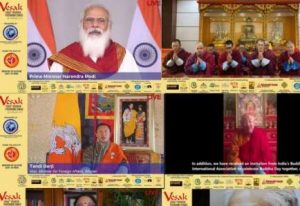
An easy practice with faith as an expedient means
Nagarjuna Bodhisattva is recognized as the “Founder of the Eight Schools in Mahayana Buddhism.” He also inaugurated the Pure Land commentarial tradition with his Chapter on Easy Practice. In it, he wrote, “There are infinite ways to practice the Buddhist teachings. They are similar to taking different paths in the world: some are difficult, and some easy. Traveling overland on foot is toilsome, while traveling the seas by ship is joyous. It is the same with the Bodhisattva paths. Some practitioners may be diligent in practice and rapid in progress, but others take the easy practice, with faith as an expedient means, so that they can rapidly reach the state of Avinivartaniya (non-retrogression).”
In traditional bodhisattva teachings, practitioners are required to set forth the Bodhi Mind: to pursue the Buddhist Way, and to deliver all sentient beings. It is a common understanding that practitioners must diligently practice all kinds of virtues in order to benefit themselves by benefiting others.
When we consider the bodhisattva teaching and all its implications, we can see that there are donors as well as beneficiaries or receivers. In other words, if a bodhisattva such as Bhikshu Dharmakara (the former incarnation of Amitabha Buddha) has already achieved Buddhahood, then it must follow that sentient beings will receive benefits in one way or another. But for this to happen, there must be an easy method that allows for all sentient beings to receive the merits and virtues dedicated by Amitabha Buddha. This is the meaning of cultivating the Bodhi Mind.
As Amitabha Buddha has accomplished all his vows in the causal ground, sentient beings who believe in and accept his teaching of deliverance and practice accordingly must be benefited. So, Pure Land Buddhism is a teaching of deliverance (being benefited, by other-power, or traveling the seas by ship), not a teaching of cultivation (to benefit others, by self-power, or traveling overland on foot).
This faith is based on the belief that the accomplishment of Amitabha’s vows is true
Faith in Amitabha’s deliverance is not based on our own feelings, but on Shakyamuni Buddha’s words spoken in the three Pure Land sutras. Faith cannot be manufactured in the mind; it must be rooted in the sutras. In this case, we know Shakyamuni Buddha taught that Amitabha Buddha formulated and accomplished his 48 Vows, in particular the 18th Vow, so that all aspirants can be reborn in his Pure Land by reciting his name.
Master Huijing said, “This faith is based on the belief that the achievement of Buddhahood by Bhikshu Dharmakara is true, and this fact becomes the content of our faith. This faith does not originate from our internal mind; but has to depend on externality—an external and objective fact, in which we have faith in our internal mind.”
Master Huijing further said, “Because Amitabha’s vow is not just empty talk, we say that by practicing Amitabha-recitation, we are assured of rebirth: all of us can be reborn, and it is easy to attain rebirth. This is not stated from the side of sentient beings, but entirely from the side of Amitabha Buddha. Rebirth through Amitabha-recitation is, therefore, applicable to all kinds of people—regardless of whether they are ordinary or sagely beings, good or bad persons. None of them will fail to be reborn.”
Amitabha-recitation is the principal karma of assured rebirth
In the Chapter on Easy Practice, Nagarjuna Bodhisattva offers a complete yet concise interpretation of the Fundamental Vow: “Amitabha Buddha’s Fundamental Vow is like this: If someone recites my name and takes refuge in me, this person at once attains the karma of assurance and will achieve supreme enlightenment (anuttara-samyak-sambodhi). One should therefore recite often.”
This paragraph is extremely important. Within it, Nagarjuna Bodhisattva explains the essence of Amitabha’s 18th Vow in just a few sentences. He clearly points out that name-recitation is the key method to attaining the karma of assurance (the state of non-retrogression) instantly, and is the main cause of rebirth leading to supreme enlightenment. Faith is not even mentioned here.
In the 16th Contemplation in the Contemplation Sutra, Shakyamuni says: “Because of reciting Amitabha’s name, his karmic offenses of billion eons are cleared; thus the reciter can be reborn in the Land of Bliss.” Here, too, it should be noted that Amitabha’s name is the main cause of rebirth. Again, faith is not mentioned at all.
Faith refers to entrusting ourselves to Amitabha Buddha, and his Name. To have faith in Amitabha Buddha is to embrace the profoundest mystery of the universe, and to completely entrust our lives to the Buddha. Accepting and following his teachings about attaining rebirth in the Land of Bliss, we always exclusively recite “Namo Amitabha” in accordance with the Fundamental Vow. In other words, all of it is done when we simply act in response to the great 18th Vow accomplished by Amitabha Buddha.
In his Commentary on the Contemplation Sutra, Master Shandao, the de facto founder of Pure Land Buddhism, says, “To recite Amitabha’s name single-mindedly and without variation, whether walking, standing, sitting or lying down, whether for long or short periods—that is the karma of assurance. It is so because it accords with Amitabha Buddha’s vow.” He also followed the lineage initiated by Nagarjuna Bodhisattva and taught Amitabha-recitation in accordance with the Fundamental Vow.
In Pure Land Buddhism, faith refers to faith in Amitabha’s deliverance. Only Amitabha (as the Dharma body) is real. Only Amitabha’s great six-character name is truly the crystallization of his myriad of virtues. Only Amitabha Buddha can lead sentient beings to ultimate purity. Because of his Fundamental Vow, one who believes in and accepts Amitabha’s deliverance and exclusively recites Amitabha’s name will be reborn in the Land of Bliss.
We have seen here on multiple occasions that faith is understood as an expedient means, while Amitabha-recitation is the principal karma of assured rebirth—in other words, the main cause of rebirth in the Land of Bliss.











